Views
Using Foreign Choice-of-Law Clauses to Avoid U.S. Law
Can private actors utilize choice-of-law clauses selecting the laws of a foreign country to avoid laws enacted by the United States? In this post, I argue that the answer is a qualified yes. I first examine situations where the U.S. laws in question are not mandatory. I then consider scenarios where these laws are mandatory. Finally, the post looks at whether private parties may rely on foreign forum selection clauses and foreign choice-of-law clauses—operating in tandem—to avoid U.S. law altogether.
Read more
Civil Personal Status Law Litigation in the UAE – Between Lofty Ideals and Sour Realities

I. Introduction
It is not uncommon for scholars to debate whether private international law is needed as a distinct discipline, and whether it is truly indispensable. After all, could one not save the effort and complexity of applying foreign law by simply treating all cases as purely domestic? From a theoretical standpoint, the answer is yes, since no State is under an inherent obligation to apply foreign law. Yet, such an approach entails serious shortcomings, particularly when it comes to respecting vested or acquired rights, meeting the legitimate expectations of the parties, and fostering cross-border commerce. It follows that the costs of refusing to recognize and apply foreign law are far greater than the difficulties associated with maintaining a system of private international law. It is therefore unsurprising that private international law has established itself as a common language for managing the legal diversity inherent in transnational relations. Read more
2025 New Chinese Arbitration Law: Improvements Made and To Be Further Made
(This post is written by Dr. Chen Zhi who is an Attorney at Zhiheng Law Firm Guangzhou Office, PRC).
I. Introduction
On September 12, 2025, the newly revised Arbitration Law (hereinafter New Arbitration Law) of the People’s Republic of China (hereinafter “PRC”) was adopted by the Standing Committee of the National People’s Congress (hereinafter as “SCNPC”) with the subsequent promulgation by the President of PRC, and will take effect on March 1, 2026. The New Arbitration Law features novelties such as the introduction of “arbitration seat”, limited liberalization of ad hoc arbitration, enshrining online arbitration, a higher threshold for eligibility of arbitrator, and a shorter duration for applying for annulment of arbitral award from six months to three months. Nonetheless, some articles of the New Law leave room for further discussion. This article combs through the history of revision, delves into the highlights and remaining gaps of the New Arbitration Law, and provides insights into its significance for the development of commercial arbitration in Mainland China from the perspective of an arbitration practitioner in Mainland China. Read more
News
AMEDIP’s upcoming webinar: A radical change in German Private International Law, the example of the naming law (in Spanish)

The Mexican Academy of Private International and Comparative Law (AMEDIP) is holding a webinar on Thursday 25 September 2025 at 14:30 (Mexico City time – CST), 22:30 (CEST time). The topic of the webinar is: A radical change in German Private International Law, the example of the naming law, which will be presented by Prof. Dr. Karl August von Sachsen Gessaphe (in Spanish).
Giustizia consensuale No 1/2025: Abstracts
 The first issue of 2025 of Giustizia consensuale (published by Editoriale Scientifica) has been released, and it features:
The first issue of 2025 of Giustizia consensuale (published by Editoriale Scientifica) has been released, and it features:
Cesare Cavallini (Professor at Bocconi University, Milan), L’arbitrato come processo e giustizia consensuale (Arbitration as a Process and Consensual Justice; in Italian).
The essay aims to analyze the phenomenon of private autonomy and consensual justice in arbitration as it has evolved through various reforms. The goal is to highlight arbitration as a process and a form of consensual justice that is alternative yet distinct from ordinary judicial proceedings and fully aligned with constitutional principles. This objective becomes even more significant when compared to the very different and controversial issues discussed in American legal doctrine, which instead point to an unceasing erosion of rights through a blending of public interferences in arbitration and private ones in ordinary justice, raising concerns about the legitimacy of private autonomy within the framework of civil protections under constitutional scrutiny. Read more
Call for abstracts on the Succession Regulation (EU) 650/2012
The private international law experts from the University Rovira i Virgili (URV-Tarragona) and the University of Lleida (UdL) together with the Notarial Association of Catalonia, are organizing I INTERNATIONAL CONFERENCE ON THE REVIEW OF REGULATION (EU) 650/2012 AFTER TEN YEARS OF APPLICATION.
– The deadline for receiving abstracts has been extended until 29 September 29 2025.
– The scientific committee will decide on the acceptance on 14 October 2025.
– The conference will take place in Barcelona, on 11 and 12 of November 2025.
The call is open for any of the main thematic areas: scope, definitions, jurisdiction, applicable law, recognition, enforceability and enforcement of decisions and documents, the European Certificate of Succession and other complementary provisions. Communications accepted will be presented in person during the seminar for approximately five or seven minutes each. Applications to present a communication proposal must meet the following requirements: identification of the author and his/her academic category, the subject to which the paper belongs, the title of the communication, an abstract of the communication, which should be between 300 and 500 words in length.
The application should be sent to: reglamentosucesiones@urv.cat
Communications will be selected according to their relevance in terms of the chosen thematic area; quality in the treatment of the topic and originality.
This Conference is part of the research project: “The review of Regulation 650/2012, in matters of succession: application assessment and proposals for amendments”, which is funded by the Spanish Ministry of Science, Innovation and Universities (reference PID2023-149454NB-I00). The duration of the project is four years (2024-2028) and this Conference is the first international scientific meeting planned among the project activities.
More information i available at the official web page.



